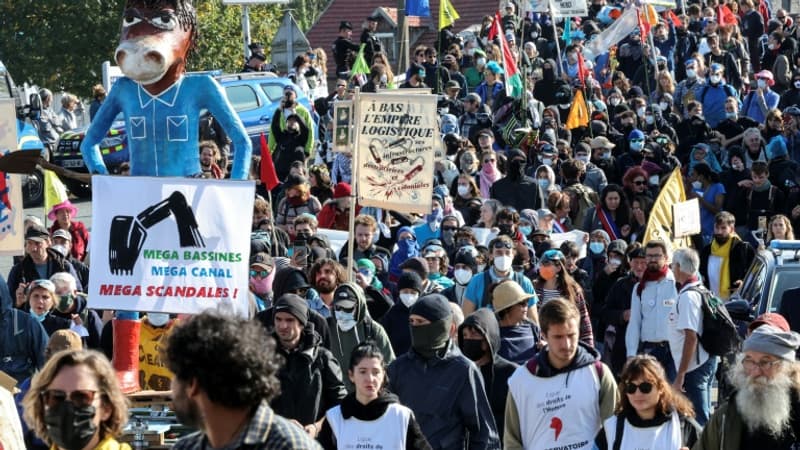This is what is called a categorical rejection of a project classified as an “environmental disaster.” More than a thousand people demonstrated this Saturday, October 11, at the call of environmental groups near Thourotte (Oise) to ask to “stop the construction” of the Seine-North Europe canal, which should connect the Seine basin with the main ports of northern Europe within ten years.
The demonstration, the first mobilization of such magnitude against this channel, is held within the framework of an activist weekend at the initiative of several groups, including Les Soulèvements de la Seine (a branch of the Earth Uprisings), Extinction Rebellion and Mega Canal Non Merci.
Under construction from 2022
The elected environmentalist Sandrine Rousseau criticized this project carried out by “elected people who believe they are pharaohs” and that will allow “the number of trucks to multiply on each side of the canal.” “It is not an ecological project when we do everything specifically,” he stated, calling for public policies that encourage reasoned and local consumption, and not projects that benefit from imports from “the other side of the world.”
Agnès Ducharne, a research hydrologist at the CNRS, protested that the canal, whose works began in 2022, is, according to her, “a harmful project”, “from the last century”. For her, “the environmental science research community realizes that policies that move towards artificialization are harmful.”
The cheerful parade with a marching band and giant dragonflies is organized with the support of the Ecological and Social Alliance, including in particular the FSU, Solidaires, the Peasant Confederation, Greenpeace and Friends of the Earth.
107 kilometers of waterways
For its defenders, the Seine-North Europe canal, which should connect the Seine with the Escaut and the main ports in the north of the continent thanks to 107 kilometers of wide-width navigable waterways, constitutes an “ecological solution” that would reduce road transport.
But opponents criticize this river road for its cost, its impact on biodiversity and water resources, fearing that it will not produce a modal shift but rather a frenetic increase in flows.
Its estimated cost in 2019 is 5 billion euros, financed by the State, local authorities and European funds. This budget, which is already much higher than initial estimates, should be revised significantly upwards.
Opponents also denounce an “environmental disaster”, related to the artificialization of “3,200 hectares of agricultural land”, “300 protected species” threatened or even significant water retention, all compensated by measures considered “illusory”.
Source: BFM TV


